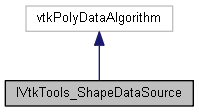VTK data source for OCC shapes polygonal data.
More...
#include <IVtkTools_ShapeDataSource.hxx>
|
|
| virtual int | RequestData (vtkInformation *theRequest, vtkInformationVector **theInputVector, vtkInformationVector *theOutputVector) override |
| | This is called by the superclass. This is the method you should override if you use this class as ancestor. Build output polygonal data set from the shape wrapper. More...
|
| |
VTK data source for OCC shapes polygonal data.
◆ IVtkTools_ShapeDataSource()
| IVtkTools_ShapeDataSource::IVtkTools_ShapeDataSource |
( |
| ) |
|
|
protected |
Shape wrapper used as an input.
◆ ~IVtkTools_ShapeDataSource()
| virtual IVtkTools_ShapeDataSource::~IVtkTools_ShapeDataSource |
( |
| ) |
|
|
protectedvirtual |
Shape wrapper used as an input.
◆ Contains()
Checks if the internal OccShape pointer is the same the argument.
- Parameters
-
| [in] | shape | OccShape pointer to be checked. |
- Returns
- true if the two OccShape instances are the same, and false otherwise.
◆ FastTransformModeOff()
| void IVtkTools_ShapeDataSource::FastTransformModeOff |
( |
| ) |
|
|
inline |
Set the source OCCT shape.
- Parameters
-
| theOccShape | [in] OCCT shape wrapper. |
◆ FastTransformModeOn()
| void IVtkTools_ShapeDataSource::FastTransformModeOn |
( |
| ) |
|
|
inline |
Set the source OCCT shape.
- Parameters
-
| theOccShape | [in] OCCT shape wrapper. |
◆ GetId()
Returns ID of the shape used as a topological input for this data source.
- Returns
- requested ID.
◆ GetShape()
Get the source OCCT shape.
- Returns
- occShape OCCT shape wrapper.
◆ RequestData()
| virtual int IVtkTools_ShapeDataSource::RequestData |
( |
vtkInformation * |
theRequest, |
|
|
vtkInformationVector ** |
theInputVector, |
|
|
vtkInformationVector * |
theOutputVector |
|
) |
| |
|
overrideprotectedvirtual |
This is called by the superclass. This is the method you should override if you use this class as ancestor. Build output polygonal data set from the shape wrapper.
- Parameters
-
| theRequest | [in] information about data object. In current implementation it is ignored. |
| theInputVector | [in] the input data. As adata source is the start stage of the VTK pipeline, theInputVector is empty and not used (no input port). |
| theOutputVector | [in] the pointer to output data, that is filled in this method. |
◆ SetShape()
Set the source OCCT shape.
- Parameters
-
| theOccShape | [in] OCCT shape wrapper. |
◆ SubShapeIDs()
| vtkSmartPointer<vtkIdTypeArray> IVtkTools_ShapeDataSource::SubShapeIDs |
( |
| ) |
|
Access to the shape's sub-shape ids array.
- Returns
- the array cast to vtkIdTypeArray
◆ transform()
| vtkSmartPointer<vtkPolyData> IVtkTools_ShapeDataSource::transform |
( |
vtkPolyData * |
theSource, |
|
|
const gp_Trsf & |
theTrsf |
|
) |
| const |
|
protected |
Transforms the passed polygonal data by the given OCCT transformation matrix.
- Parameters
-
| theSource | [in] source polygonal data to transform. |
| theTrsf | [in] transformation to apply. |
- Returns
- resulting polygonal data (transformed copy of source).
◆ vtkTypeMacro()
◆ myIsFastTransformMode
Indicates whether light-weighted processing for transformed shapes is enabled. If so, data source does not re-compute the discrete model for the input topological shape. It rather uses the already existing one and applies the necessary transformation to it.
◆ myIsTransformOnly
Internal flag indicating that the current working shape is just a transformed copy of the previously processed one. This flag is used in a couple with "fast transformation" mode flag.
◆ myOccShape
Shape wrapper used as an input.
◆ myPolyData
Polygonal representation of shape.
The documentation for this class was generated from the following file:
